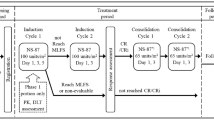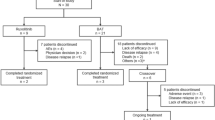Abstract
The management of myelodysplastic syndromes (MDS) in elderly patients is a significant clinical problem. The therapeutic options range from observation alone for patients with low-risk disease, lenalidomide for patients with 5q-syndrome, to 5-azacytidine (5-AZA) for patients with higher risk of disease. In this paper, we summarize the clinical course of three patients with high-risk MDS treated with 5-AZA as well as the management and supportive care measures for adverse events. As expected, based on available clinical trials data, the agent resulted in clinical and hematological improvement in these patients with acceptable side effects. 5-AZA is an attractive option for elderly patients with high-risk MDS.
Similar content being viewed by others
References
Lee JS, Lindquist K, Segal MR, Covinsky KE. Development and validation of a prognostic index for 4-year mortality in older adults. JAMA. 2006;295:801–808.
Bennett JM, Catovsky D, Daniel MT, et al. Proposals for the classification of the myelodysplastic syndromes. Br J Haematol. 1982;51:189–199.
The International Agency for Research on Cancer. Swerdlow SH, Campo E, Harris NL, et al, eds. WHO Classification of Tumors of Haematopoietic and Lymphoid Tissues. 4th Edition. Lyon: IARC Press; 2008.
Greenberg P, Cox C, LeBeau MM, et al. International Scoring System for evaluating prognosis in myelodysplastic syndromes. Blood. 1997;89:2079–2088.
Malcovati L, Germing U, Kuendgen A, et al. Time-dependent prognostic scoring system for predicting survival and leukemic evolution in myelodysplastic syndromes. J Clin Oncol. 2007;25:3503–3510.
Park MJ, Kim HJ, Kim SH, et al. Is International Prognostic Scoring System (IPSS) still standard in predicting prognosis in patients with myelodysplastic syndrome? External validation of the WHO Classification-Based Prognostic Scoring System (WPSS) and comparison with IPSS. Eur J Haematol. 2008;81:364–373.
Hasse D. Cytogenetic features in myelodysplastic syndromes. Ann Hematol. 2008;87:515–526.
List A, Dewald G, Bennett J, et al. Lenalidomide in the myelodysplastic syndrome with chromosome 5q deletion. N Engl J Med. 2006;355:1456–1465.
Sierra J, Pérez WS, Rozman C, et al. Bone marrow transplantation from HLA-identical siblings as treatment for myelodysplasia. Blood. 2002;100:1997–2004.
Aul C, Gatterman N, Schneider W. Age related incidence and other epidemiological aspects of myelodysplastic syndromes. Br J Haematol. 1992;82:358–367.
Silverman LR, Demakos EP, Peterson BL, et al. Randomized controlled trial of azacitidine in patients with the myelodysplastic syndrome: a study of the cancer and leukaemia group B. J Clin Oncol. 2002;20:2429–2440.
Kantarijan H, O’Brien S, Ravandi F. Proposal for a new risk model in myelodysplastic syndrome that accounts for events not considered in the original International Prognostic Scoring System. Cancer. 2008;113:1351–1361.
Oken MM, Creech RH, Tormey DC, et al. Toxicity and response criteria of The Eastern Cooperative Oncology Group. Am J Clin Oncol. 1982;5:649–655.
Fenaux P, Mufti GJ, Hellstrom-Lindberg E, et al. Efficacy of azacitidine compared with that of conventional care regimens in the treatment of higher-risk myelodysplastic syndromes: a randomised, open-label, phase III study. Lancet Oncol. 2009;10:223–232.
Seymour JF, Fenaux P, Silverman LR, et al. Effects of azacitidine compared with conventional care regimens in elderly (≥75 years) patients with higher-risk myelodysplastic syndromes. Crit Rev Oncol. 2010;76:218–227.
Santini V, Fenaux P, Mufti GJ. Management and supportive care measures for adverse events in patients with myelodysplastic syndromes treated with azacytidine. Eur J Haematol. 2010;85:130–138.
Silverman LR, McKenzie DR, Peterson BL, et al. Further analysis of trials with azacitidine in patients with myelodysplastic syndrome: studies 8421, 8921, and 9221 by the Cancer and Leukemia Group B. J Clin Oncol. 2006;24:3895–3903.
Author information
Authors and Affiliations
Corresponding author
Rights and permissions
About this article
Cite this article
Campelo, M.D., Delgado, R.G., Molias, A.C.G. et al. Azacytidine for the treatment of myelodysplastic syndromes in the elderly. Adv Therapy 28 (Suppl 2), 10–15 (2011). https://doi.org/10.1007/s12325-010-0097-3
Received:
Published:
Issue Date:
DOI: https://doi.org/10.1007/s12325-010-0097-3




